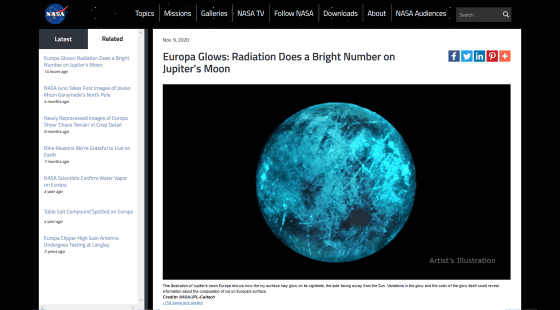NASA reports that the surface of Jupiter's moon Europa may be shining in the dark, out of reach of sunlight

by
Europa, Jupiter's moon, is thought to have a sea of water inside the ice crust, and it has been pointed out that extraterrestrial life may exist. NASA has announced the results of a study that the surface of Europa may be 'shining in the dark.'
Laboratory predictions for the night-side surface ice glow of Europa | Nature Astronomy
https://www.nature.com/articles/s41550-020-01248-1
Europa Glows: Radiation Does a Bright Number on Jupiter's Moon | NASA
https://www.nasa.gov/feature/jpl/europa-glows-radiation-does-a-bright-number-on-jupiters-moon

Jupiter's moon Europa may glow in the dark --CNN
NASA is planning a detailed exploration of Europa, which is expected to have life, and plans to launch a spacecraft called Europa Clipper from 2023 to 2025. Therefore, the research team of Jet Propulsion Laboratory , which develops and operates unmanned spacecraft, has studied the effects of exposure to the surface of Europa.
Jupiter is known to emit a large amount of radiation, and the satellite Europa is also receiving a large amount of radiation. In order to investigate 'how organic matter under the ice reacts to radiation', the research team reproduced the composition of ice on the surface of Europa and conducted an experiment to actually irradiate it.

From past observations, the ice on the surface of Europa is thought to be composed of chlorides commonly found on Earth, such as water, magnesium sulfate, and sodium chloride. When the research team used their own equipment to irradiate the ice that reproduced the surface of Europa with radiation, it was confirmed that the ice itself shines due to the irradiation of radiation before organic matter.
The reason why the radiation emitted when the ice is irradiated is due to a phenomenon called
The moon shines in the dark night sky because it reflects the sun's rays, but Europa's light emission mechanism is completely different from that of the moon, so the research team points out that it shines on the side where sunlight does not reach. 'If Europa hadn't been exposed to radiation, it would have been dark in the shade of the sun, like our moon, but it received radiation from Jupiter,' said Murthy Gudipati, the lead author of the paper. Because of this, Europa glows even in the dark, out of the reach of the sun. '

by
The results seemed unexpected to the research team, and co-author Fred Bateman said, 'When we saw the sodium chloride saline solution glowing very weakly, we turned our research direction. I changed it. '
It seems that the light emitted by the ice of Europa looks greenish to the naked eye, but when the composition of chloride contained in the ice changes, the color of the light also changes, so in some cases it looks blue or white. 'I never imagined we would see something like this,' said research team Bryana Henderson. 'When we tried the new ice composition, the glow looked different. We He stared at it for a while and said, 'This is new, isn't it? This is definitely a different light, isn't it?' So when I pointed the spectrometer at it, each ice had a different spectrum of light. ' Stated.
From this result, the research team argues that it may be possible to clarify the composition of ice from the spectrum of light by using a spectrometer in the exploration of Europa by Europa Clipper and others. 'We can predict that the night-side glow of Europa will provide additional information about the surface composition of Europa,' said Gudipati. 'This change in composition gives us a clue as to whether Europa has life-friendly conditions. You can do it. '

by Kevin Gill
Related Posts:
in Science, Posted by log1h_ik







